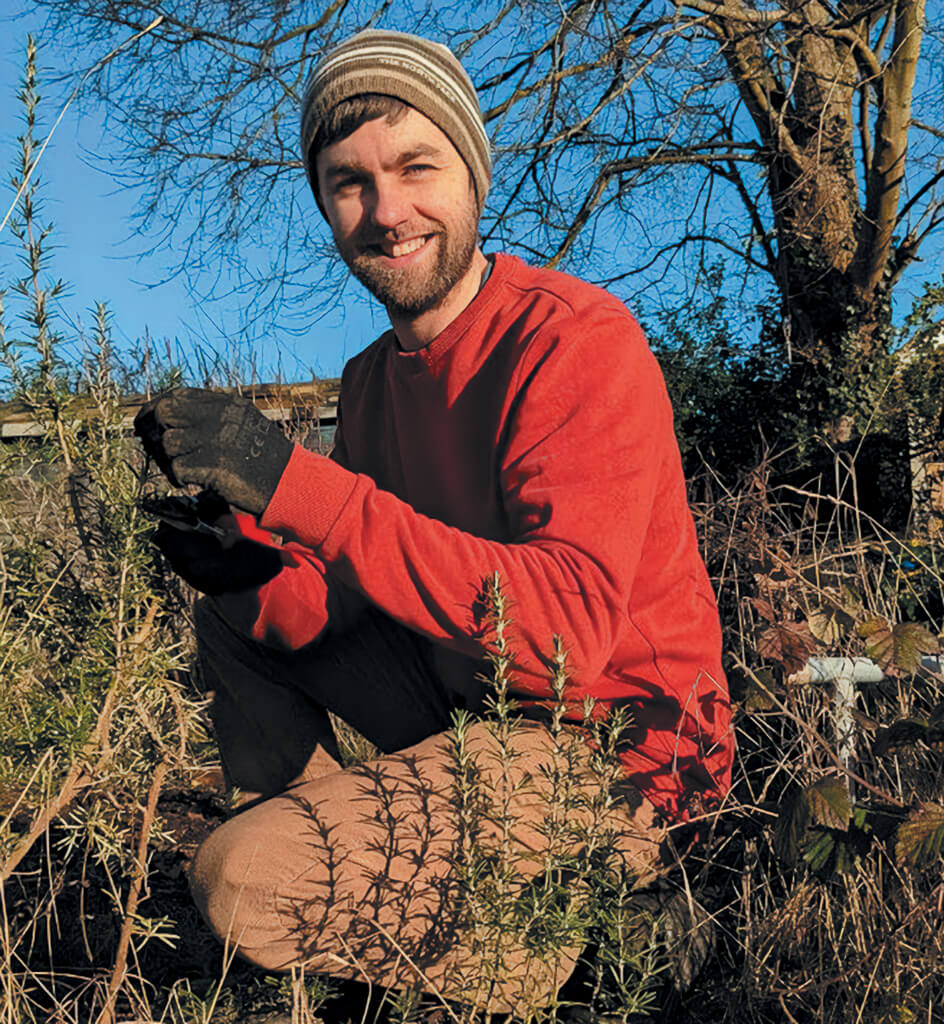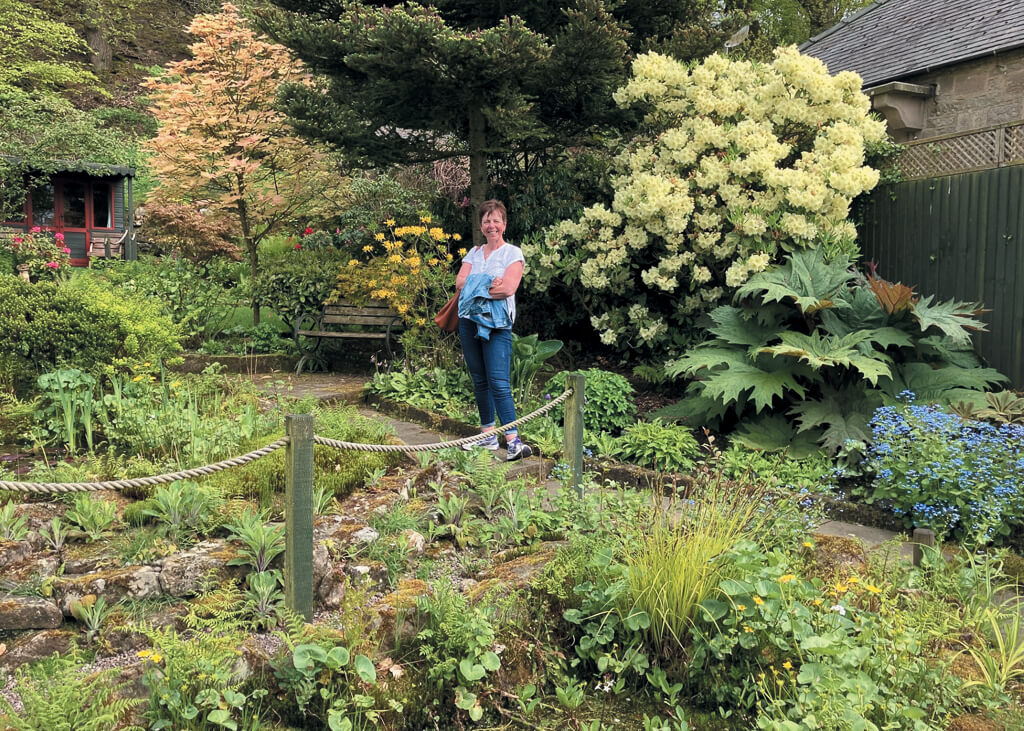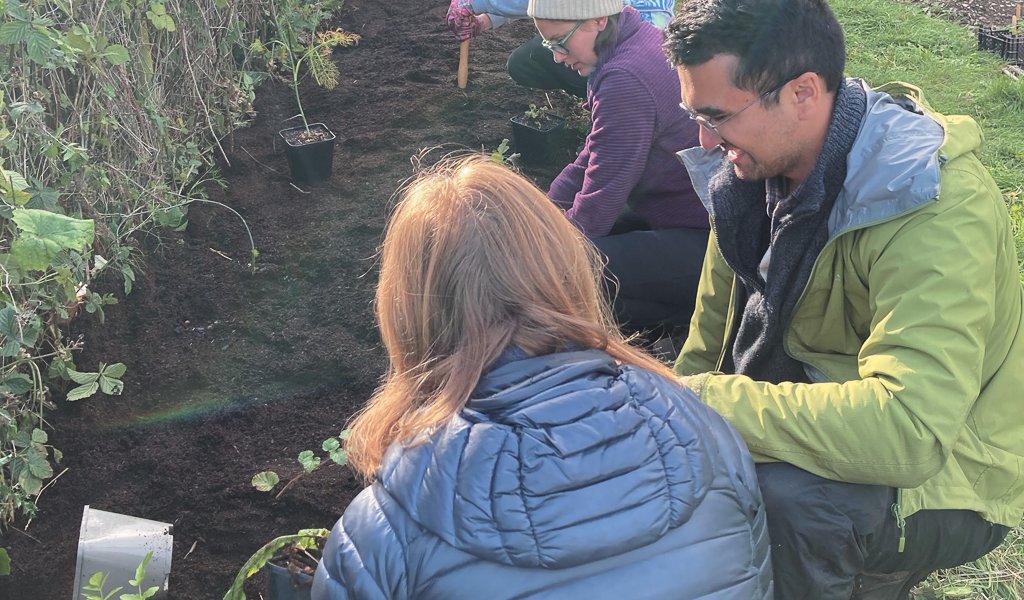EARTHED UP! is a plant nursery on the edge of Belper that is leading the way in sustainable horticulture, writes Catherine Roth.
Based on holistic land management, Earthed Up! grows all of its plants entirely off grid, without the use of harmful chemicals, and watered only with rainwater.

It has been designed according to the permaculture principles of sustainable gardening, and Earthed Up!’s ethos is to tread as lightly as possible, caring for the earth, its people and the future, whilst growing healthy and climate-resilient plants.
Sited in a small rented garden plot, Earthed Up! is run as a workers’ cooperative by a team of three. Ryan Sandford-Blackburn, one of the founding members of the nursery in 2021, together with the team, has been developing the small site since then at Belper Lane End.
During this time they had to decide which plants would be allowed to stay. Ryan says: “We have no problem with dandelions and bindweed creeping over the wall, but if it’s growing into any of our plants, it becomes a weed so we take it out.” Squeezed into the small space are two polytunnels, composting bins, a shed and a demonstration garden.
The small plot in Belper is complemented by a larger site in Crich, a paddock which Ryan calls their ‘stock garden’. It is here that Earthed Up! grows its shrubs including fruit bushes and hardy ground cover such as comfrey. Ryan says: “There are badgers and 40 free-range hens, so the planting needs to be resilient!” He also stresses the importance to the wider story around gardening – for Earthed Up!, growing your own is not simply about the variety of plant but who planted it, giving gardening the personal touch.
Despite working on such a small scale, Earthed Up! offers an impressive selection of over 120 varieties of perennial vegetables, fruit and herbs – all of which are useful and most of which are edible. Some of the many plants available to purchase include Babington’s leek, land cress, mashua, purple plantain, sunchokes and skirret. Earthed Up! are happy to talk about any of the plants, complemented further by details of how to harvest the plants and their benefits on Earthed Up!’s website.
Ryan is particularly enthusiastic about herbs, which he suggests adding to salads, omelettes, stir fries and pestos, particularly during the ‘hungry season’ that occurs between January to April each year when there are fewer crops to harvest.
He says, “‘Herb’ is an older word than ‘vegetable’ and in French means ‘useful plant’. Herbs were typically bred a lot less than vegetables, which were bred to be a particular colour, uniform in harvest, and mild in flavour. We’ve not messed around with herbs so much and they pack a punch with flavour. You can eat herbs as part of a dish, not just using them as seasoning.”
The choice of herbs gives different flavours to salads. Ryan says: “Pick a flavour palette for one dish. For a lemony salad, add lemon balm and sorrel. For an oniony salad, include chives, leeks and wild garlic, and for a mild salad – dandelions and plantains.” As for mints, Earthed Up! grows a wide range including lavender, ginger and Moroccan, while Ryan recommends the strawberry mint for cocktails and mocktails.
Other herbs have medicinal uses. Ryan says: “Comfrey is an organic gardener’s best friend as it can be cut and used to make plant feed. It’s also known as ‘knit bone’ as the chemicals in it help to produce new cells so helps to heal fractures and fissures.”
Another use for plants is that of natural dyes, appealing to local artists. The leaves of the woad plant produce a natural blue dye, the roots of the madder plant make a red dye, whilst chamomile and perennial coreopsis produce yellows.
Earthed Up! sells a range of compost that is peat free, as well as wood bark and sheep fleece, as the secret to a successful and resilient garden lies in the soil. Ryan says: “We need to feed our soil. With healthy soil, plants are much less likely to suffer from drought, pests – animals and insects – and diseases.”
With its ethos of sustainable, eco-friendly gardening, it is no surprise that Earthed Up! is a strictly peat-free zone using Melcourt peat-free compost, incorporating biochar, mixed with charcoal from a local woodland for all its potting compost.
With great importance given to soil health, Earthed Up! also makes its own bokashi, a more environmentally friendly form of compost. Ryan says: “There is no need to turn or water bokashi. Instead you just chuck stuff in and leave it, then after 12 weeks you have a usable product. Bokashi is fermented in a low oxygen environment with bacteria and yeast, effective micro-organisms that break down the organic matter. It differs to more traditional compost as it doesn’t reduce in volume, it provides great worm food, and its distinctive smell isn’t as attractive to rats.”
He adds: “With traditional compost, the manure, clippings and cuttings are watered, heated and turned. Half of the volume is lost as the air space collapses and nitrates are released into the atmosphere.”
The team at Earthed Up! are keen to share their skills and knowledge with others. They run soil health clubs, composting courses and teach permaculture, forest gardening and plant propagation. Most of the courses take place at its Belper site but the cooperative has recently been awarded grant funding from Central England Coop, enabling it to take their soil health club on the road to schools, garden groups, U3A and wildlife groups. For those too busy to garden, Earthed Up! also offers a garden maintenance service to individuals.
Earthed Up! began its journey inspired by Cool Temperate nursery near Nottingham. When the nursery was due to close due to retirement, Ryan and three other founding members decided to start their own. They wanted to offer healthy, edible and useful perennial plants – many of which were the more unusual varieties – and gardening according to permaculture principles.
The greatest barrier to starting the cooperative was finding a plot of land, which involved going from door to door asking if there was any land to rent. Earthed Up! then sought loans from individuals and began by selling its peat-free compost, attending fairs and giving talks, while working hard to establish the nursery.
While Earthed Up! works on a small scale, it gardens with a global vision. Ryan says: “People need to grow more of their own climate-resilient food plants. There are massive methane risks in the Arctic and there are floods, droughts and wildfires. By 2030 the equatorial belt will be uninhabitable. By growing our own food, it puts less pressure on systems further away. We need to ask how ethical our food from the supermarket will be when it’s not coming from Europe and Asia, but from North and East Africa that is not growing sufficient food for its own populations.”
Ryan graduated with a degree in Film and Television Production before working as Strategic Communications Coordinator for eight years, organising events and telling the story of the permaculture network.
His enthusiasm for gardening stems from his love of food. He says: “I like quality food that you can grow yourself. My mum was not so keen on cooking, so I was happy to help in the kitchen in my teenage years. I’m diabetic, so I have to be conscious of food and when I had chronic fatigue after glandular fever, I went for walks and foraged and then would make something nutritious.”
He then volunteered at York Unifying Multicultural Initiative’s garden every weekend, which he found to be a perfect way to learn. Ryan says: “As part of the project, we were growing food plants from around the world to unify multiple countries through food and gardening.” There, Ryan was introduced to edible plants he hadn’t come across before including leaf amaranth and huauzontle.
Editor’s note: Earthed Up! is open at Belper Lane End, DE56 2DL on Tuesdays and Fridays 9.30am-12.30pm and Saturdays 10am-12noon.
Open Gardens – and an NGS show garden at Chelsea!
MAY is probably the most beautiful month in the garden, and if you’re interested in gardens you may well follow the coverage of this year’s Chelsea Flower Show (May 21-25), writes Tracy Reid.

For the second time only in its history, the National Garden Scheme (NGS) will have a show garden at the prestigious Chelsea Flower Show, sponsored by ‘Project Giving Back’. The garden designer is Tom Stuart-Smith who, as many of you will know, has been developing areas of the garden at Chatsworth House. There will be a second Derbyshire connection in that some of the plants for the Chelsea garden have been provided by Griselda Kerr of ‘The Dower House’ in Melbourne, who opens her own garden for the NGS.
George Plumptre, chief executive of the National Garden Scheme, says: “We very much hope that our presence at RHS Chelsea Flower Show and our show garden will inspire more people to visit our open gardens in 2024.”
If you are inspired to visit some Derbyshire gardens in May, then a perfect example of a beautiful garden which has opened its gates for many years is Moorfields, Temple Normanton, which will be open on Sunday 26th and Monday 27th of May (1-5pm each day). It actually has two adjoining gardens, each planted for seasonal colour, which during the late spring and early summer feature perennials including alliums, lupins, camassia and bearded irises. The larger garden has mature, mixed beds and borders, a gravel garden to the front, a small wildflower area, large wildlife pond, orchard, soft fruit beds and vegetable garden. Admission is £4, children admitted free. There’ll be refreshments and plants for sale too.
Another NGS Open Garden is at 2 Haddon View, Stanton in Peak, on May 18 and 19, from 12.30-4.30pm each day. The garden is at the top of the hill in the village and there are, of course, lovely views.
You will see gorgeous rhododendrons with red, white, pink and yellow blooms, and spring flowers including marsh marigolds and dog’s tooth violets. Newts and frogs will be swimming in the ponds, cacti will be flowering in the greenhouse, and patio pots will be full of all sorts of plants. You’ll even find a palm tree in the front garden!
Entry to the garden is just £4, with children admitted free. You can enjoy delicious homemade cakes, and a drink of tea or coffee.
Details of all the NGS Open Gardens to visit are on the website at www.ngs.org.uk






